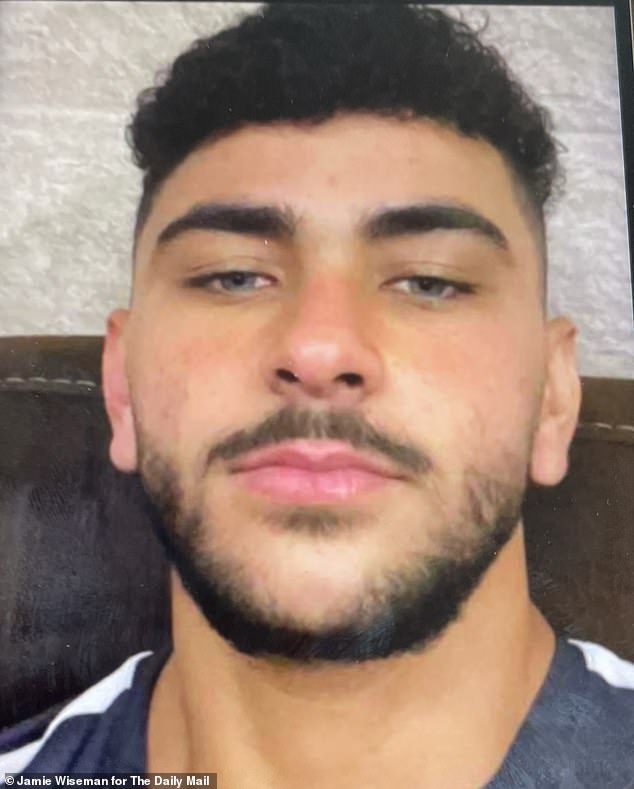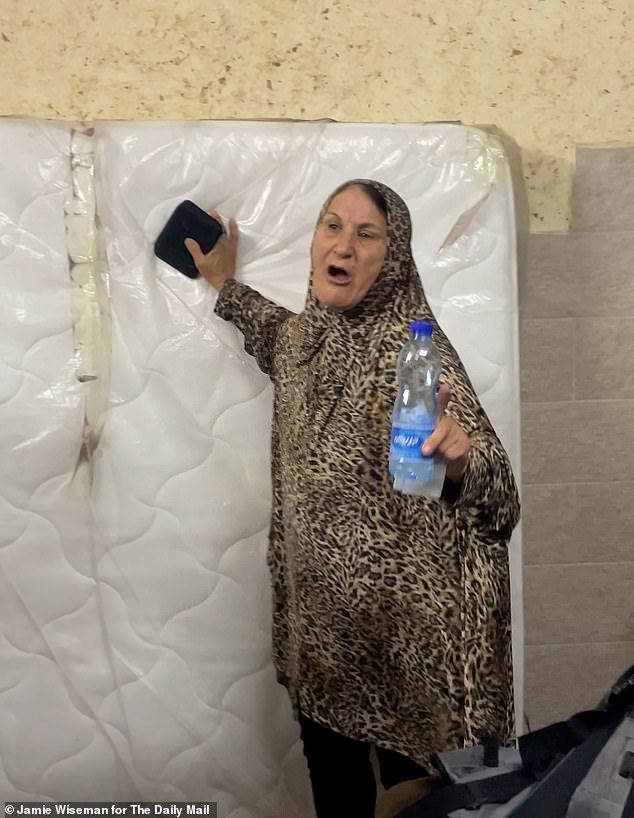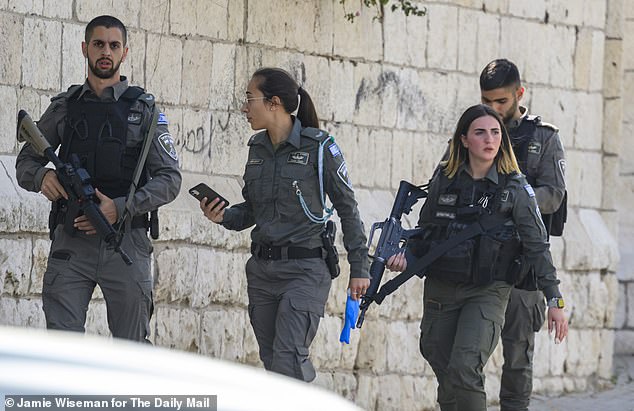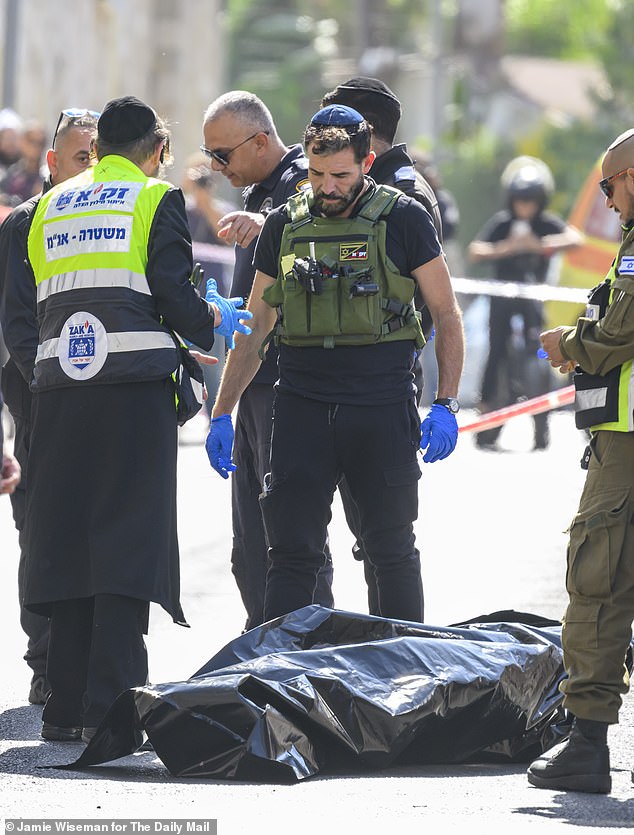I heard the gunfire from my hotel, and found the teenager lying outside the cathedral where Archbishop Welby preached peace days ago… RICHARD PENDLEBURY at the scene of the Jerusalem attack
He lay face up in the gutter, next to the entrance to St. George’s Cathedral, where the Archbishop of Canterbury had preached peace and reconciliation only a few days earlier.
I heard the fatal shots from my bathroom as I was finishing a late shave; two bursts of automatic fire interrupted the sounds of children playing in the adjacent primary school.
By the time I arrived on the scene, 17-year-old Adam Abu Alhawa’s blood had flowed some ten meters down the gentle slope of the Nablus road; as vibrant in the warm sun as the bougainvillea tumbling over the wall at the French consulate.
Paramedics in blue rubber gloves pulled out from the back of their vehicle a cardboard box with the words “Baby Wipes” written on it.
Shortly afterwards the boy’s corpse was lifted – rather roughly – into the middle of the road and placed in a black body bag, which was then stuffed into another before the whole hideous package was taken away in an armored van. Shortly afterwards, traffic started again.
Sudden death on a beautiful morning in Jerusalem. The Palestinian teenager was shot as he fled on foot after allegedly stabbing and wounding an Israeli border police officer at a nearby gas station.
His family would be punished by the authorities, everyone expected that. Hate for hate, tit for tat, eye for an eye, as is the age-old custom here. Anyway, what’s one death among so many?

By the time I arrived on the scene, 17-year-old Adam Abu Alhawa’s blood had flowed some ten meters down the gentle slope of the Nablus road. In the photo: Adam Abu Alhawa

Adam Abu Alhawa’s mother cried in their home after he was shot dead by police
On October 7, Hamas terrorists based in the Gaza Strip breached the border and massacred some 1,300 Israelis, mostly civilians. Since then, Israeli retaliatory strikes have reportedly killed 8,000 Palestinians in Gaza.
The killing continues as the Israeli ground offensive gains momentum.
Yet what we saw yesterday seemed to evoke the abyss towards which this country, and perhaps the region, is heading.
Gaza is on fire. The occupied West Bank could be next. Who then was Adam Abu Alhawa? Why did the boy decide to do what he did, with so little hope of escaping alive? A middle-aged Palestinian discreetly approaches me at the police cordon. He asks where I come from. Then an unexpected question. Would I like to take his phone, move closer to the police line and photograph the body, to help confirm its identity to the family?
“The police will get me in trouble if they know I’m related,” Ahmed explains. Then: ‘He (the dead boy) was my cousin. His name is Adam. If you want, I can take you to his house?’
We’re going with Ahmed’s car. We have to take a detour, through the Jaffa Gate, because Israeli security forces are already closing roads around the perpetrator’s neighborhood, as they always do on these grim occasions.
Along the way we pass a young Jewish couple walking their baby in a buggy. The man is carrying an assault rifle.
Ahmed also heard the shots and then received a call from a cousin who said he thought Adam was involved. The family asked Ahmed to investigate.
He sighs. “He’s not the first boy and won’t be the last (to die). We should live a normal life, but now we live in the end of days. Even if Adam did what they (the Israelis) say he did, who made him do it? No one. It’s the current situation.’
Ahmed earns his living by guiding tourists from all over the world. But since October 7, the city has been empty. ‘Look there, at the Garden of Gethsemane (where Jesus was arrested before his crucifixion), normally so many people, now no one.’
It is difficult to escape Biblical allusions here. Adam’s family lives on Palm Sunday Road, right at the top of the Mount of Olives, from where Jesus is said to have ascended into heaven.

The Palestinian teenager was shot as he fled on foot after allegedly stabbing and wounding an Israeli border police officer at a nearby gas station. In the photo: the IDF on the ground

I heard the fatal shots from my bathroom as I was finishing a late shave; two bursts of automatic fire interrupted the sounds of children playing in the adjacent primary school. In the photo: the IDF on the ground
They have lived here for 700 years, says Ahmed. But we can’t reach the house at first. A police cordon has again been set up outside the Chapel of the Ascension.
The young, female, Israeli officer, armed with an assault rifle, is not friendly. “This area is closed, you have to go,” we are ordered. The atmosphere is extremely tense.
But not long after, the police retreat, slowly retreating further up the hill with their weapons drawn. A crowd of relatives and neighbors then enter the two-storey building with views over the Kidron Valley towards Bethany and Bethlehem.
We are encouraged by the family to enter the dead boy’s house to see what just took place there.
The boy’s father, Nasser, has been disabled since birth and can only walk with sticks.
He made a living selling postcards and photos of tourists next to the family’s camel. In the past hour, he was taken into police custody along with two of his three daughters – Fatima and Asil – and a cousin.
His wife Mariam is present, but hysterical. Her modest home is a scene of destruction.
The family refrigerator door has been ripped off its hinges and the food has been trampled underfoot. Mirrors are destroyed, beds and chairs are turned upside down and things are on the floor.
I am handed a fragment of Adam’s Jordanian passport – Jerusalem was part of Jordan until 1967 – which has been torn in two. Relatives claim they were beaten and money taken during the raid.
They fear that the house will be demolished, as happens to the homes of those who attack Israeli security forces.
“They (Israelis) are the terrorists, not the people of Gaza,” Mariam shouts. “They shot my son, beat us, stole from us and destroyed my house.”
“She doesn’t know Adam is dead yet,” an uncle whispers to me. “Please don’t tell her yet. The Israelis will not officially admit it until the army secures the area.”
The family seems genuinely stunned by Adam’s death. He worked with his older brother Ahmad making aluminum windows. He had no known connections with radicals, they say. “It is no longer safe in this country,” says Ahmed. ‘People have started to hate each other now.
‘It is not just the Israeli state against Hamas, but the people against the people. I think this is the last war between Palestine and Israel. No one can stop it now.’
Outside, on Palm Sunday Road, Adam’s aunt talks to a local television crew.
“They’re doing this because they want our country!” she screamed. “They want us to go, but we will never give up!”
As we leave, we hear gunshots on the Mount of Olives.
“There will be problems now,” Ahmed says. He takes us for coffee in his house overlooking the Dome of the Rock.
The windows rattle as Israel’s Iron Dome system intercepts incoming rockets fired from Gaza by Hamas.
